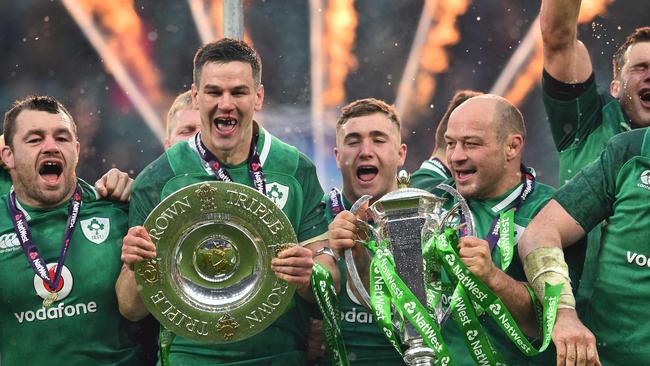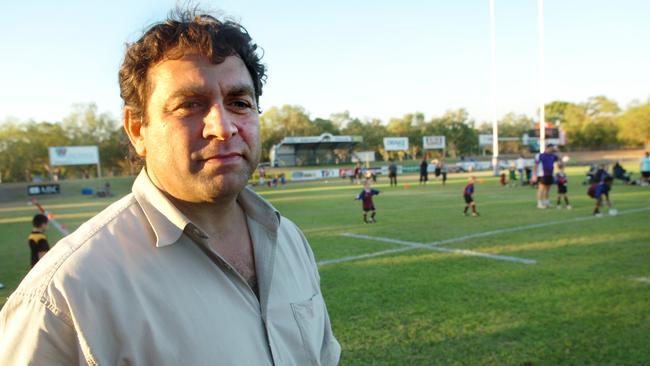Australian rugby rejected expat Aussie David Nucifora’s world-beating Irish system
IRISH rugby has never been stronger and the Australian who helped them rise by weaponising Ireland’s centralised system says he tried build the same model in Australia a decade ago.

Wallabies
Don't miss out on the headlines from Wallabies. Followed categories will be added to My News.
THEY are ranked no.2 in the world, have the best Test team in Europe and the champion provincial team as well, and are regarded as a legitimate contender for the 2019 Rugby World Cup.
Irish rugby is in arguably the strongest shape it has ever been and the man who weaponised Ireland’s centralised system to make it happen says he was trying to build the same model in Australia a decade ago.
Former Wallabies hooker and Super Rugby-winning Brumbies coach David Nucifora has been a central figure behind the global resurgence of Irish rugby, as Performance Director for the IRFU since 2014.
Under Nucifora, the IRFU have developed a streamlined national system where all coaches, players and football-related staff are centrally contracted across all the provinces. All big decisions in player workload, talent pathways and player distribution are overseen by the IRFU, with the national team’s interest in mind.

The twist? It’s the same type of model Nucifora was trying to build in Australia when he was the ARU high performance boss between 2008 and 2012. The changes, as also pushed by then CEO John O’Neill, were met with resistance from boards and member states.
“I have been through the system and when I left here at the end of 2012, we were moving in that direction of trying to create a more centralised model,” Nucifora said.
“And then that probably led to John and I leaving. And then the whole thing was unravelled.
“I hear rumours they are trying to go back down that path now, five years later. I don’t know. Some of the same people are still involved in Australian rugby, maybe they have had a change of heart and think it is a better way to go.”
Based on the evidence of Ireland’s rugby fortunes over the last few years, and the similarities in player pool size with Australia, it’s hard to see many better ways.
Nucifora accepted his current job from the IRFU in late 2013, a few years after a post-2011 World Cup review identified required changes.
Irish rugby already had a central system, dating back to the start of professionalism in 1996, but the co-ordination between the IRFU and the four provinces - Leinster, Ulster, Munster and Connacht - was left to committees.
TEAM: Wallabies muscle up for Sydney decider
“That was my brief - to really get alignment in professional rugby, moving forward,” Nucifora said.
“The Irish system they actually had already in place was actually the best in the world anyway, they just didn’t realise they had it.
“My view on that was based on knowing the Australian model but having also worked in the New Zealand system (as Blues coach) for four years, and understanding what good looked like.
On top of players, the IRFU effectively contract everyone involved in, and leading up, to the professional game.
“My role oversees all the national team and programs but as part of that, the four provinces answer through to the central body. We contract the CEOs, we contract the head coaches, we contract the head of strength and conditioning, the physiotherapists, the head of academies and the elite player development staff that work within that,” Nucifora said.
“We have built on that, and we have invested a lot into the pathways. So we employ the nutritionists and analysts and strength and conditioners, who work off the academies. Then we make sure all of those people, who might be wearing Munster or Leinster colours but are all IRFU employers, use a strategy that is consistent so everyone is on the same page. That’s the strength of the model.”

Like all Irish sport, rugby is proudly provincial and there are always “a few spats” about region trying to maintain their identity.
“The balance is between what are the good pieces of that parochialism that you want to keep because that’s their identity, but in a nationalised system, what do you have to ensure it doesn’t roadblock because the national team is incredibly important in any country,” Nucifora said.
“It’s the team that drives finance, as well. We have to make sure the national team remains our priority.”
Nucifora says the two key strengths of the Ireland system are retaining control of the player pathway - from bringing young players in right through to deploying them in professional teams - and managing player workload.
Johnny Sexton’s game-time is managed by the IRFU down to the minute for Leinster and Ireland, to prevent burn-out. He only started five games in the Pro14 this year, but led Leinster to a Heineken Cup title and Ireland to a Six Nations Grand Slam.
“We would suffer the same way as some of the southern hemisphere countries, because we don’t have the financial clout that England and France do,” Nucifora said.
“We figure if we look after our players really well, with good coaching structures, good support services and look after their wellbeing, we are looking after their longevity. And the players are smart enough to understand that can be monetised. If they can get an extra few years, it probably negates the difference of what they can get elsewhere.
“But more importantly, players want to win things and at the moment the system is helping to win things; both provincially and internationally.”
“The good thing about our system, people say “oh its hard on the provinces.” But I think this year is a really good example of that you can do both.”
Australian rugby has long resisted such centralised control from above; whether it be due to lack of trust in the ARU, self-interest or both.
Governance reforms has long been mooted but even longer voted down.
Michael Cheika used the Super Rugby bottom-out last year to get most states on board with a quasi-centralisation, in terms of high performance. Super Rugby coaches and bosses all agreed to sign on to “One Plan” initiatives of sharing conditioning, skills, analysis and medical programs.
It has seen noticeable improvements inside a year. but the Brumbies’ rejection of Cheika’s request to rest David Pocock, Scott Sio and Allan Alaalatoa showed people will still retreat to corners.
“In all sport around the world, everyone suffers from that (self-interest),” Nucifora said.
“Governance in sport is hugely important and you need to get the best governance model you can. You then need to get like-minded people working together in a system that allows you to do your job.
“The system allows us in Ireland to gather good people to work together to get outcomes. It doesn’t mean we don’t have arguments about things along the way. It’s not smooth sailing all the time, that’s for sure.
“But I think at the end of the day, people realise what we are trying to do is for the right reasons. For the good of Irish rugby, across the board. Not just the national team, but for the provinces as well. We are trying to create things for the long-term, that are sustainable.”
LIVE Stream the Australia v Ireland June Rugby Series on FOX SPORTS. SIGN UP NOW >
